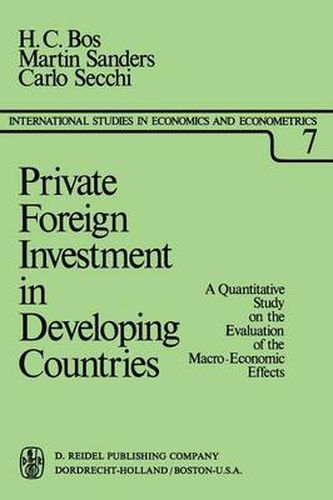Readings Newsletter
Become a Readings Member to make your shopping experience even easier.
Sign in or sign up for free!
You’re not far away from qualifying for FREE standard shipping within Australia
You’ve qualified for FREE standard shipping within Australia
The cart is loading…






This title is printed to order. This book may have been self-published. If so, we cannot guarantee the quality of the content. In the main most books will have gone through the editing process however some may not. We therefore suggest that you be aware of this before ordering this book. If in doubt check either the author or publisher’s details as we are unable to accept any returns unless they are faulty. Please contact us if you have any questions.
This study is the result of research undertaken by the Netherlands Economic Institute, Division Balanced International Growth, Rotterdam, under the auspices of the O.E.C.D. Development Centre. In the division of labour agreed with professor Grant L. Reuber, who directed a parallel study under the auspices of the Centre’ , the N.E.I. research deals with the evaluation of economic effects of private foreign investment in developing countries. The effects studied are confined to macro-economic effects which are quantifi able. The lack of a satisfactory methodology for the assessment of these effects seemed to justify this limitation in the approach to the evaluation of private foreign investment. The study is organized as follows. Part I reviews briefly and critically the literature about the evaluation of private foreign investment and suggests the need for an appropriate macro-economic methodology. Part II develops the principles and techniques for such a methodology which is applied empirical ly to data for five developing countries in Part III. While Parts II and III are concerned with the effects of aggregated volumes of private foreign invest of the previous parts, the appraisal of ment, Part IV considers, independently projects financed through foreign investment and discusses the special fea tures of social benefit-cost analysis of such projects.
$9.00 standard shipping within Australia
FREE standard shipping within Australia for orders over $100.00
Express & International shipping calculated at checkout
This title is printed to order. This book may have been self-published. If so, we cannot guarantee the quality of the content. In the main most books will have gone through the editing process however some may not. We therefore suggest that you be aware of this before ordering this book. If in doubt check either the author or publisher’s details as we are unable to accept any returns unless they are faulty. Please contact us if you have any questions.
This study is the result of research undertaken by the Netherlands Economic Institute, Division Balanced International Growth, Rotterdam, under the auspices of the O.E.C.D. Development Centre. In the division of labour agreed with professor Grant L. Reuber, who directed a parallel study under the auspices of the Centre’ , the N.E.I. research deals with the evaluation of economic effects of private foreign investment in developing countries. The effects studied are confined to macro-economic effects which are quantifi able. The lack of a satisfactory methodology for the assessment of these effects seemed to justify this limitation in the approach to the evaluation of private foreign investment. The study is organized as follows. Part I reviews briefly and critically the literature about the evaluation of private foreign investment and suggests the need for an appropriate macro-economic methodology. Part II develops the principles and techniques for such a methodology which is applied empirical ly to data for five developing countries in Part III. While Parts II and III are concerned with the effects of aggregated volumes of private foreign invest of the previous parts, the appraisal of ment, Part IV considers, independently projects financed through foreign investment and discusses the special fea tures of social benefit-cost analysis of such projects.